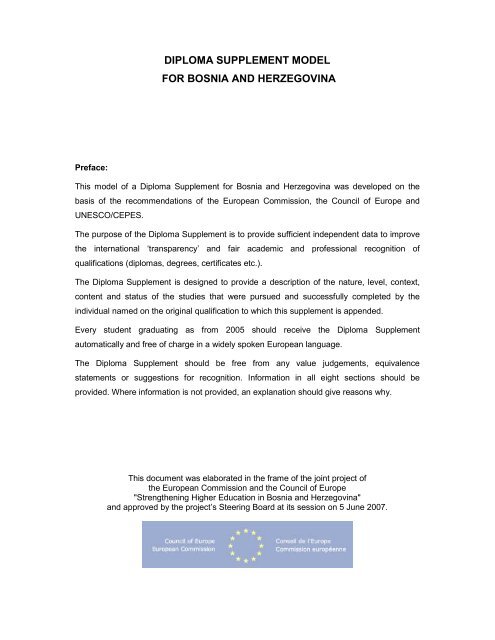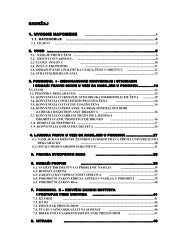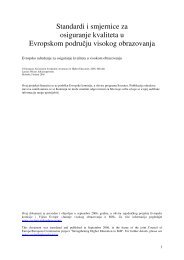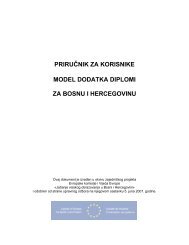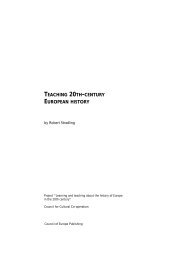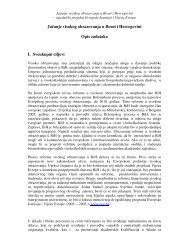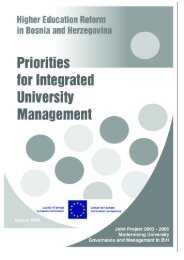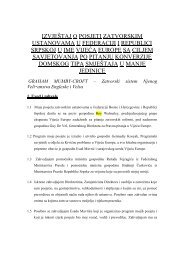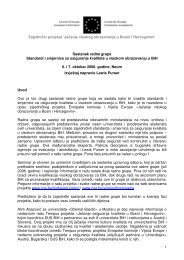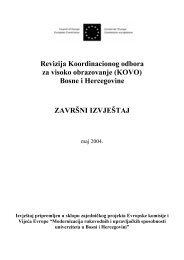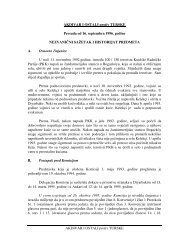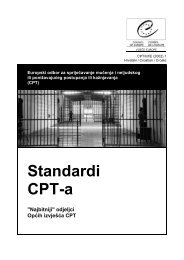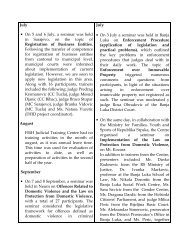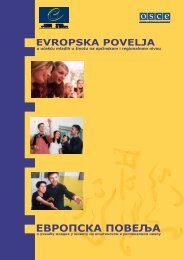diploma supplement model for bosnia and herzegovina - Council of ...
diploma supplement model for bosnia and herzegovina - Council of ...
diploma supplement model for bosnia and herzegovina - Council of ...
You also want an ePaper? Increase the reach of your titles
YUMPU automatically turns print PDFs into web optimized ePapers that Google loves.
DIPLOMA SUPPLEMENT MODEL<br />
FOR BOSNIA AND HERZEGOVINA<br />
Preface:<br />
This <strong>model</strong> <strong>of</strong> a Diploma Supplement <strong>for</strong> Bosnia <strong>and</strong> Herzegovina was developed on the<br />
basis <strong>of</strong> the recommendations <strong>of</strong> the European Commission, the <strong>Council</strong> <strong>of</strong> Europe <strong>and</strong><br />
UNESCO/CEPES.<br />
The purpose <strong>of</strong> the Diploma Supplement is to provide sufficient independent data to improve<br />
the international ‘transparency’ <strong>and</strong> fair academic <strong>and</strong> pr<strong>of</strong>essional recognition <strong>of</strong><br />
qualifications (<strong>diploma</strong>s, degrees, certificates etc.).<br />
The Diploma Supplement is designed to provide a description <strong>of</strong> the nature, level, context,<br />
content <strong>and</strong> status <strong>of</strong> the studies that were pursued <strong>and</strong> successfully completed by the<br />
individual named on the original qualification to which this <strong>supplement</strong> is appended.<br />
Every student graduating as from 2005 should receive the Diploma Supplement<br />
automatically <strong>and</strong> free <strong>of</strong> charge in a widely spoken European language.<br />
The Diploma Supplement should be free from any value judgements, equivalence<br />
statements or suggestions <strong>for</strong> recognition. In<strong>for</strong>mation in all eight sections should be<br />
provided. Where in<strong>for</strong>mation is not provided, an explanation should give reasons why.<br />
This document was elaborated in the frame <strong>of</strong> the joint project <strong>of</strong><br />
the European Commission <strong>and</strong> the <strong>Council</strong> <strong>of</strong> Europe<br />
"Strengthening Higher Education in Bosnia <strong>and</strong> Herzegovina"<br />
<strong>and</strong> approved by the project’s Steering Board at its session on 5 June 2007.
DIPLOMA SUPPLEMENT MODEL FOR BOSNIA AND HERZEGOVINA<br />
1. INFORMATION IDENTIFYING THE HOLDER OF THE QUALIFICATION<br />
1.1 Family Name:<br />
1.2 First Name:<br />
1.3 Date, Place, Country <strong>of</strong> Birth:<br />
1.4 Number/Code <strong>of</strong> Student or student card:<br />
2. INFORMATION IDENTIFYING THE QUALIFICATION<br />
2.1 Name <strong>of</strong> the Qualification (Full, Abbreviated):<br />
Name <strong>of</strong> Title (Full, Abbreviated):<br />
2.2 Main Field(s) <strong>of</strong> Study <strong>for</strong> the Qualification:<br />
2.3 Name <strong>of</strong> the Institution Awarding the Qualification:<br />
Status (Type/Control)<br />
2.4 Name <strong>of</strong> the Institution Administering the Studies:<br />
Status (Type/Control):<br />
2.5 Language(s) <strong>of</strong> Instruction/Examination:<br />
3. INFORMATION ON THE LEVEL OF THE QUALIFICATION<br />
3.1 Level <strong>of</strong> the Qualification:<br />
3.2 Official Length <strong>and</strong> workload <strong>of</strong> the Programme:<br />
3.3 Access Requirement(s):<br />
4. INFORMATION ON THE CONTENTS AND RESULTS GAINED<br />
4.1 Mode <strong>of</strong> Study:<br />
4.2 Program Requirements:<br />
4.3 Program Details:<br />
4.4 Grading Scheme, Grade distribution guidance<br />
4.5 Overall Classification:<br />
5. INFORMATION ON THE FUNCTION OF THE QUALIFICATION<br />
5.1 Access to Further Study:<br />
5.2 Pr<strong>of</strong>essional Status:<br />
6. ADDITIONAL INFORMATION<br />
6.1 Additional In<strong>for</strong>mation:<br />
6.2 Additional In<strong>for</strong>mation Sources:<br />
2
7. CERTIFICATION OF THE SUPPLEMENT<br />
7.1 Date<br />
7.2 Signature<br />
7.3 Capacity<br />
7.4 Official Stamp/Seal<br />
8. INFORMATION ON THE HIGHER EDUCATION SYSTEM 1<br />
As a member country <strong>of</strong> the Bologna Process Bosnia <strong>and</strong> Herzegovina (BiH) is presently<br />
undergoing far reaching re<strong>for</strong>ms to join the European Area <strong>of</strong> Higher Education by 2010.<br />
At the same time the state <strong>of</strong> BiH has a complex administrative set up dividing legislative<br />
<strong>and</strong> administrative authority <strong>for</strong> education regionally as well as among various governing<br />
levels. Alone 13 legislative bodies 2 are competent <strong>for</strong> enacting the relevant legislation.<br />
There<strong>for</strong>e the higher education system at times varies from one part <strong>of</strong> the country to the<br />
other.<br />
At present (May 2007), there are 8 public universities <strong>and</strong> 22 private higher education<br />
institutions in Bosnia <strong>and</strong> Herzegovina. 3 All institutions must be licensed by the ministry <strong>of</strong><br />
education in charge <strong>for</strong> the region in which the higher education institution is situated 4 .<br />
Some progress has been made with the introduction <strong>of</strong> internal <strong>and</strong> external quality<br />
assurance mechanisms at most higher education institutions <strong>and</strong> first legal stipulations<br />
<strong>for</strong> external accreditation are in place in parts <strong>of</strong> BiH. However, a countrywide<br />
accreditation system is not yet in place in BiH.<br />
8.1 ACCESS TO HIGHER EDUCATION<br />
Applicants <strong>for</strong> higher education are required to have successfully accomplished<br />
secondary education comprising 4 years <strong>of</strong> full time schooling. The credential that entitles<br />
<strong>for</strong> application is the ‘svjedodžba o zavrženoj srednjoj školi’ (certificate on completion <strong>of</strong><br />
secondary education).<br />
1 This Section must be regularly updated by <strong>and</strong> the update accessible to all higher education<br />
institutions in BiH. The update is usually made by the national ENIC or NARIC centre <strong>and</strong> published<br />
on its website. Prior to the establishment <strong>of</strong> the BiH ENIC at state level this task should be<br />
accomplished by the Ministry in charge <strong>of</strong> higher education at state level..<br />
2 Governmental authorities <strong>of</strong> the state <strong>of</strong> BiH are further divided among 2 first-order administrative<br />
divisions: the Republika Srpska <strong>and</strong> the Federacija Bosna i Hercegovina, the latter being subdivided<br />
into 10 Cantons. In addition to these two entities, BiH comprises the internationally supervised Brčko<br />
District, an administrative unit under the sovereignty <strong>of</strong> the state <strong>of</strong> BiH. Legislative competences in<br />
education are attributed to the BiH Parliament, the Republika Srpska National Assembly, the<br />
Parliament <strong>of</strong> the Federation <strong>of</strong> BiH, the 10 Cantonal Assemblies <strong>and</strong> the District Brčko Assembly.<br />
3 These figures require regular updating.<br />
4 In BiH, 11 ministries <strong>of</strong> education (one in Republika Srpska <strong>and</strong> ten in the ten Cantons <strong>of</strong> the<br />
Federation <strong>of</strong> BiH) have full competence over education including higher education. In Brčko District,<br />
the Department <strong>for</strong> Education <strong>of</strong> Brčko District has full competence over education. At state level, the<br />
Ministry <strong>for</strong> Civil Affairs is m<strong>and</strong>ated to coordinate educational policy witin the country. The Ministry <strong>of</strong><br />
Education <strong>and</strong> Science <strong>of</strong> the FBIH has decision making competences to adopt st<strong>and</strong>ards <strong>and</strong><br />
regulations <strong>for</strong> higher education <strong>and</strong> is responsible to coordinate between the 10 cantonal ministries <strong>of</strong><br />
education.<br />
3
Detailed in<strong>for</strong>mation about access to individual higher education institutions in BiH can be<br />
obtained via the BiH country pages on the ENIC-NARIC website 5 , i.e. via links to the<br />
individual universities’ websites.<br />
8.2 DEGREES AND QUALIFICATIONS<br />
Study programmes, degrees <strong>and</strong> qualifications in BiH are currently in transition towards a<br />
full scale three cycle system. The progress <strong>of</strong> re<strong>for</strong>m varies from region to region <strong>and</strong><br />
institution to institution.<br />
According to the traditional system<br />
• four years <strong>of</strong> full time studies lead to a <strong>diploma</strong> degree.<br />
• Subsequent two years <strong>of</strong> study lead to a magistar nauka degree.<br />
• Doctoral studies lead to the degree <strong>of</strong> doktor nauka.<br />
The degree <strong>of</strong> Doktor nauka (the equivalent to a PhD) is awarded <strong>for</strong> after a minimum <strong>of</strong><br />
three years <strong>of</strong> independent research. C<strong>and</strong>idates with a specijalist <strong>and</strong> master degree<br />
apply by submitting a research proposal to a committee, established by respective<br />
university, to evaluate the proposal <strong>and</strong> decide on the application.<br />
The doktorska disertacija (Doctoral dissertation) is required to be a result <strong>of</strong> an<br />
independent research project <strong>of</strong> a c<strong>and</strong>idate <strong>and</strong> to contribute to progress <strong>of</strong> science in<br />
respective field. Upon successful public defence <strong>of</strong> the doctoral dissertation the c<strong>and</strong>idate<br />
is awarded the academic degree <strong>of</strong> Doktor nauka.<br />
The new study programs which are <strong>of</strong>fered in line with the Bologna Process comprise<br />
• A first cycle <strong>of</strong> 180 – 240 ECTS credits (three or four years full time study) to obtain<br />
the degree <strong>of</strong> diplomiran/a, which is the first degree.<br />
• Upon completion <strong>of</strong> this first degree, 60 – 120 ECTS credits (one or two years <strong>of</strong><br />
full time study) lead to the magistar degree, the second degree. Altogether higher<br />
education studies leading to a second degree require 300 ECTS credits (5 years),<br />
i.e. 180 + 120 or 240 + 60 ECTS credits (3 plus 2 years or 4 plus 1 year.)<br />
• In<strong>for</strong>mation about exceptions to the above described rule (e.g. <strong>for</strong> medical studies)<br />
in BiH can be obtained via the BiH country pages on the ENIC-NARIC website 6 <strong>and</strong><br />
the individual universities’ websites.<br />
8.3 CREDIT SYSTEM AND GRADING<br />
The academic year in BiH usually lasts 10 months, starting in October <strong>and</strong> ending in July.<br />
The academic year is divided into two semesters.<br />
The unit to define a full-time student workload during one semester is kredit or bod. The<br />
full-time workload <strong>for</strong> one academic year equals to 60 kredita or bodova (ECTS credits).<br />
There are some differences in the grading system <strong>for</strong> undergraduate <strong>and</strong> postgraduate<br />
examinations between the public higher education institutions.<br />
The University <strong>of</strong> Sarajevo, the University «Džemal Bijedić» in Mostar, the University <strong>of</strong><br />
Bihać, the University <strong>of</strong> Banja Luka, the University <strong>of</strong> East Sarajevo, the University <strong>of</strong><br />
Zenica <strong>and</strong> the University <strong>of</strong> Tuzla apply the following grading system:<br />
ECTS Grade Grade Description<br />
A 10 excellent achievement;<br />
B 9 above average;<br />
5 http://www.enic-naric.net/members.asp?country=Bosnia+<strong>and</strong>+Herzegovina<br />
6 http://www.enic-naric.net/members.asp?country=Bosnia+<strong>and</strong>+Herzegovina<br />
4
C 8 average with small mistakes;<br />
D 7 good with significant disadvantages;<br />
E 6 satisfactory <strong>of</strong> minimum criteria;<br />
F, FX 5 did not satisfy.<br />
The University (Sveučilište) <strong>of</strong> Mostar applies the following grading system:<br />
ECTS Grade Grade Description<br />
A 5 excellent<br />
B 4 very good<br />
C/D 3 good<br />
E 2 satisfactory<br />
F 1 failed<br />
-------------------------------------<br />
5


